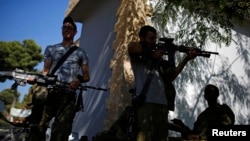Germany, France and Britain have proposed reactivating a European Union mission on the Egypt-Gaza border to help stabilize the Palestinian enclave after a month-long war, a German diplomatic source said on Wednesday.
The source said German Foreign Minister Frank-Walter Steinmeier and counterparts in Paris and London favored restoring EU operations at the Rafah crossing that is the main window on the world for Gaza's 1.8 million Palestinians.
A two-day-old Gaza cease-fire was holding on Wednesday as Egyptian mediators pursued talks with Israeli and Palestinian envoys on an enduring end to a war in which Israeli shelling wrecked whole areas of the Islamist Hamas-dominated territory.
Rafah crossing
The so-called EU Border Assistance Mission started to monitor the Rafah crossing point in 2005 as part of an accord aimed at easing Israeli security concerns after the Jewish state pulled its troops and settlers from the Gaza Strip.
The operation was halted two years later, however, when Hamas militants seized control of the coastal enclave and ousted the Western-backed Palestinian Authority.
Egypt, which was not involved in the negotiation of the 2005 agreement, repeatedly has shut the Rafah border over the past year, significantly increasing pressure on Gazans, who already face a rigid land and sea blockade imposed by Israel.
Cairo control
Egyptian diplomatic sources said that while Cairo might consider easing restrictions on movement through Rafah, it was unlikely to accept Hamas calls to allow a normal flow of trade.
Egypt wants any discussion over Rafah to take place bilaterally with the Palestinian Authority, rather than as part of any deal between the Palestinians and Israel to ease the Israeli blockade, the sources say.
“The Rafah crossing on the Egyptian side is under the full sovereignty of Egypt,” a source in the Egyptian foreign ministry in Cairo said.
The source said that a core part of Egypt's position was an insistence on Israel opening the six crossings between Israel and Gaza. He stressed that was “Israel's legal responsibility as an occupying power, under international law.”





